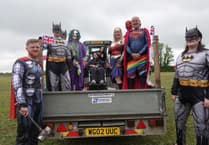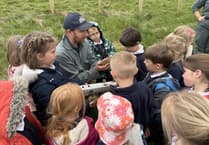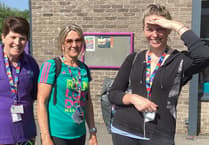LIVESTOCK on Dartmoor which has been attacked by dogs is to be DNA tested by farmers and vets, it was heard last week.
The initiative was agreed during a meeting in Princetown which saw local farmers, police, interested organisations and leading DNA experts from America attend.
The conference was called by Dartmoor Livestock Protection Society (DLPS) and Streetkleen, a bio-technology company, after DLPS launched a campaign earlier this year for a dog's DNA to be taken and recorded on a register at the same time as when the animal is microchipped — making it easier to identify the owner and dog involved in an attack.
Marion Saunders, chairperson of the DLPS, said: 'Our aim is not solely that we get dogs that attack livestock prosecuted, we want people to feel that because the dog's DNA is on a database that they are accountable and therefore the training of their dog should be a serious matter.'
In April 2016, a new law takes effect which will require everyone, with a few exceptions, to have their dog microchipped by the age of eight months. The DLPS hopes to lobby parliament for dog's DNA to be taken at the same time.
People who attended the meeting in Princetown last week included members from the Dartmoor National Park Authority, DLPS, Dartmoor Commoners Council, Country Landowners, National Sheep Association, Nature Watch and the Duchy of Cornwall.
All representatives agreed to develop the idea of tackling the growing issue of attacks on livestock by dogs.
In order to address the issue before April 2016, farmers and vets agreed to send animal samples to leading canine DNA laboratory BioPet Vet Lab, based in Tennessee, after an attack. The lab technicians already deal with DNA issues, from dog fouling to dog thefts.
Swabs taken from attacked livestock will be dried and sealed and sent to the laboratory in America where the company will test for dog DNA. The company has agreed it would provide services free of charge until such a time as the campaign is approved by government.
Ms Saunders added: 'I feel convinced that the recording of dog's DNA will come about in the long term project and become the norm.
'We have had a vet come and take DNA from an animal and the dog's DNA was isolated from the swabs. We have now proved that you can get DNA from the wounds and the lab in America has offered to extract the DNA for no charge.
'We are hoping that soon we would see it added to the requirement that DNA is taken at the same time as microchipping. The vet at the meeting said it was a simple thing and was not intrusive. It's not difficult and not expensive so this is what we will be pressing the Government for.'
Livestock protection officer for the DLPS Karla McKechnie, who is on call round the clock working for the welfare of sheep, cattle and ponies on Dartmoor, said that this year alone, 42 sheep and lambs had been killed in dog attacks.
'Sheep and lambs are killed and injured and ewes abort because of uncontrolled dogs — this is a national problem.
'The Dartmoor Livestock Protection Society is campaigning to try and make it mandatory for DNA to be taken from dogs — we have to try and do something and this will give us a procedure to identify the animal.
'The aim of this campaign is to act as a deterrent.
'We are looking for a deterrent in rural areas which have a problem with dog attacks. We know it could take years but we have got to do something.'
Managing director of Streetkleen Gary Downie said that the company helped organise the meeting to try to find a way of making people accountable for their dogs.
Streetkleen is the local franchise holder of 'PooPrints' established by BioPet Vet Lab, a programme that uses the DNA process to 'match the mess' left behind by dog owners.
PooPrints has proven successful in many countries and Streetkleen and the DLPS hope to use the same process to tackle the rising issue of dog attacks on livestock.
Mr Downie said: 'There is a willingness in Devon and across the country to deal with the issue. What we believe is that once dog owners realise the impact and that they are accountable then they will act responsibly.
'This is cost effective and has massive benefits to the local economy and environment.'




Comments
This article has no comments yet. Be the first to leave a comment.